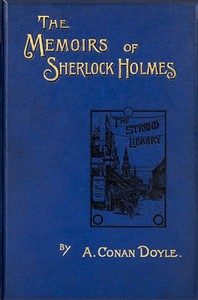The Memoirs of Sherlock Holmes by Arthur Conan Doyle (ebook reader for pc and android .txt) 📗

- Author: Arthur Conan Doyle
Book online «The Memoirs of Sherlock Holmes by Arthur Conan Doyle (ebook reader for pc and android .txt) 📗». Author Arthur Conan Doyle
“Well, there’s no need for me to dwell on that part of it. You know now what James Barclay was capable of. Bhurtee was relieved by Neill next day, but the rebels took me away with them in their retreat, and it was many a long year before ever I saw a white face again. I was tortured and tried to get away, and was captured and tortured again. You can see for yourselves the state in which I was left. Some of them that fled into Nepaul took me with them, and then afterwards I was up past Darjeeling. The hill-folk up there murdered the rebels who had me, and I became their slave for a time until I escaped; but instead of going south I had to go north, until I found myself among the Afghans. There I wandered about for many a year, and at last came back to the Punjab, where I lived mostly among the natives and picked up a living by the conjuring tricks that I had learned. What use was it for me, a wretched cripple, to go back to England or to make myself known to my old comrades? Even my wish for revenge would not make me do that. I had rather that Nancy and my old pals should think of Harry Wood as having died with a straight back, than see him living and crawling with a stick like a chimpanzee. They never doubted that I was dead, and I meant that they never should. I heard that Barclay had married Nancy, and that he was rising rapidly in the regiment, but even that did not make me speak.
“But when one gets old one has a longing for home. For years I’ve been dreaming of the bright green fields and the hedges of England. At last I determined to see them before I died. I saved enough to bring me across, and then I came here where the soldiers are, for I know their ways and how to amuse them and so earn enough to keep me.”
“Your narrative is most interesting,” said Sherlock Holmes. “I have already heard of your meeting with Mrs. Barclay, and your mutual recognition. You then, as I understand, followed her home and saw through the window an altercation between her husband and her, in which she doubtless cast his conduct to you in his teeth. Your own feelings overcame you, and you ran across the lawn and broke in upon them.”
“I did, sir, and at the sight of me he looked as I have never seen a man look before, and over he went with his head on the fender. But he was dead before he fell. I read death on his face as plain as I can read that text over the fire. The bare sight of me was like a bullet through his guilty heart.”
“And then?”
“Then Nancy fainted, and I caught up the key of the door from her hand, intending to unlock it and get help. But as I was doing it it seemed to me better to leave it alone and get away, for the thing might look black against me, and any way my secret would be out if I were taken. In my haste I thrust the key into my pocket, and dropped my stick while I was chasing Teddy, who had run up the curtain. When I got him into his box, from which he had slipped, I was off as fast as I could run.”
“Who’s Teddy?” asked Holmes.
The man leaned over and pulled up the front of a kind of hutch in the corner. In an instant out there slipped a beautiful reddish-brown creature, thin and lithe, with the legs of a stoat, a long, thin nose, and a pair of the finest red eyes that ever I saw in an animal’s head.
“It’s a mongoose,” I cried.
“Well, some call them that, and some call them ichneumon,” said the man. “Snake-catcher is what I call them, and Teddy is amazing quick on cobras. I have one here without the fangs, and Teddy catches it every night to please the folk in the canteen.
“Any other point, sir?”
“Well, we may have to apply to you again if Mrs. Barclay should prove to be in serious trouble.”
“In that case, of course, I’d come forward.”
“But if not, there is no object in raking up this scandal against a dead man, foully as he has acted. You have at least the satisfaction of knowing that for thirty years of his life his conscience bitterly reproached him for this wicked deed. Ah, there goes Major Murphy on the other side of the street. Good-by, Wood. I want to learn if anything has happened since yesterday.”
We were in time to overtake the major before he reached the corner.
“Ah, Holmes,” he said: “I suppose you have heard that all this fuss has come to nothing?”
“What then?”
“The inquest is just over. The medical evidence showed conclusively that death was due to apoplexy. You see it was quite a simple case after all.”
“Oh, remarkably superficial,” said Holmes, smiling. “Come, Watson, I don’t think we shall be wanted in Aldershot any more.”
“There’s one thing,” said I, as we walked down to the station. “If the husband’s name was James, and the other was Henry, what was this talk about David?”
“That one word, my dear Watson, should have told me the whole story had I been the ideal reasoner which you are so fond of depicting. It was evidently a term of reproach.”
“Of reproach?”
“Yes; David strayed a little occasionally, you know, and on one occasion in the same direction as Sergeant James Barclay. You remember the small affair of Uriah and Bathsheba? My biblical knowledge is a trifle rusty, I fear, but you will find the story in the first or second of Samuel.”
The Resident Patient
In glancing over the somewhat incoherent series of memoirs with which I have endeavoured to illustrate a few of the mental peculiarities of my friend Mr. Sherlock Holmes, I have been struck by the difficulty which I have experienced in picking out examples which shall in every way answer my purpose. For in those cases in which Holmes has performed some tour-de-force of analytical reasoning, and has demonstrated the value of his peculiar methods of investigation, the facts themselves have often been so slight or so commonplace that I could not feel justified in laying them before the public. On the other hand, it has frequently happened that he has been concerned in some research where the facts have been of the most remarkable and dramatic character, but where the share which he has himself taken in determining their causes has been less pronounced than I, as his biographer, could wish. The small matter which I have chronicled under the heading of “A Study in Scarlet,” and that other later one connected with the loss of the Gloria





Comments (0)